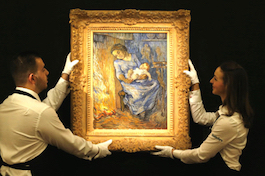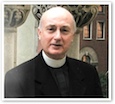Saints are always surprising
- FATHER GEORGE W. RUTLER
A 1973 film directed by Orson Welles was about forgers, and it turned out to be something of a forgery itself.
 Some of the information in "F for Fake" was itself faked. Later on, Welles claimed that this was deliberately done as a kind of joke, and he took to calling it an "essay" and "docudrama" rather than an authentic documentary. In art circles, some forgers have become celebrities, both for their skill and for their criminal cleverness.
Some of the information in "F for Fake" was itself faked. Later on, Welles claimed that this was deliberately done as a kind of joke, and he took to calling it an "essay" and "docudrama" rather than an authentic documentary. In art circles, some forgers have become celebrities, both for their skill and for their criminal cleverness.
In the last century the Hungarian forger Elmyr de Hory duped over one thousand collectors with his copies of masterpieces. John Myatt swindled Sotheby's and Christie's with his. Robert Driessen made a fortune from his slick forgeries of Giacometti. More impressive was Han van Meegeren, who became a folk hero in Holland for the way he could forge works by Vermeer. In 1911, when the Mona Lisa was temporarily stolen, Yves Chaudron was reputed to have sold six copies to unsuspecting wealthy Americans. It is surprising that Michelangelo carved what he claimed was an ancient Roman sculpture of "Eros Sleeping," which he aged by rubbing it with acidic soil. He did this when he was 21, possibly as a joke, around the same time that he made the Pietà, so he certainly was not lacking talent.
A friend asked me why forgeries are less valuable than originals, if it is hard to tell them apart. The question can be annoying, but it has a certain logic. The answer, of course, is that the value of a work consists not only in its artistry, but in its originality. In that sense, what we call creativity is a gift of God who alone is the Source of all things, including life itself. Only God is the primary Creator, and humans are his pro-creators. We cannot produce something out of nothing.
This is why sinners are predictable, while saints are always surprising.
The more individuals allow God, by a right exercise of the free will, to shape their souls according to his likeness, the more their individuality becomes pronounced. This is the work of "sanctifying grace" by which God "perfects human nature," as Saint Thomas described the process (Summa Theol. 1, 1, 8 ad. 2). The Anti-Christ cannot create, and so he tries to make human forgeries, by sin. The more people block the will of God, the more they become uninspired copies of each other. This is why sinners are predictable, while saints are always surprising. No two saints are alike.
A figure of speech, synecdoche, uses one word, as part of something, to represent the whole. Forgers are synecdoches of all sinners who pretend to be creative instead of letting God work through them. The month of November focuses on the saints, who are not cleverly crafted imitations, but who are authentic images of God who "alone has immortality, dwelling in unapproachable light, whom no man has seen nor can see" (1 Timothy 6:16).
 This is Meaghen Gonzalez, Editor of CERC. I hope you appreciated this piece. We curate these articles especially for believers like you.
This is Meaghen Gonzalez, Editor of CERC. I hope you appreciated this piece. We curate these articles especially for believers like you.
Please show your appreciation by making a $3 donation. CERC is entirely reader supported.

Acknowledgement
 Father George W. Rutler. "Saints are always surprising." From the Pastor (November 3, 2019).
Father George W. Rutler. "Saints are always surprising." From the Pastor (November 3, 2019).
Reprinted with permission of Father George W. Rutler.
The Author
 Father George W. Rutler is the pastor of St. Michael's church in New York City. He has written many books, including: The Wit and Wisdom of Father George Rutler, The Stories of Hymns, Hints of Heaven: The Parables of Christ and What They Mean for You, Principalities and Powers: Spiritual Combat 1942-1943, Cloud of Witnesses — Dead People I Knew When They Were Alive, Coincidentally: Unserious Reflections on Trivial Connections, A Crisis of Saints: Essays on People and Principles, Brightest and Best, and Adam Danced: The Cross and the Seven Deadly Sins.
Father George W. Rutler is the pastor of St. Michael's church in New York City. He has written many books, including: The Wit and Wisdom of Father George Rutler, The Stories of Hymns, Hints of Heaven: The Parables of Christ and What They Mean for You, Principalities and Powers: Spiritual Combat 1942-1943, Cloud of Witnesses — Dead People I Knew When They Were Alive, Coincidentally: Unserious Reflections on Trivial Connections, A Crisis of Saints: Essays on People and Principles, Brightest and Best, and Adam Danced: The Cross and the Seven Deadly Sins.




